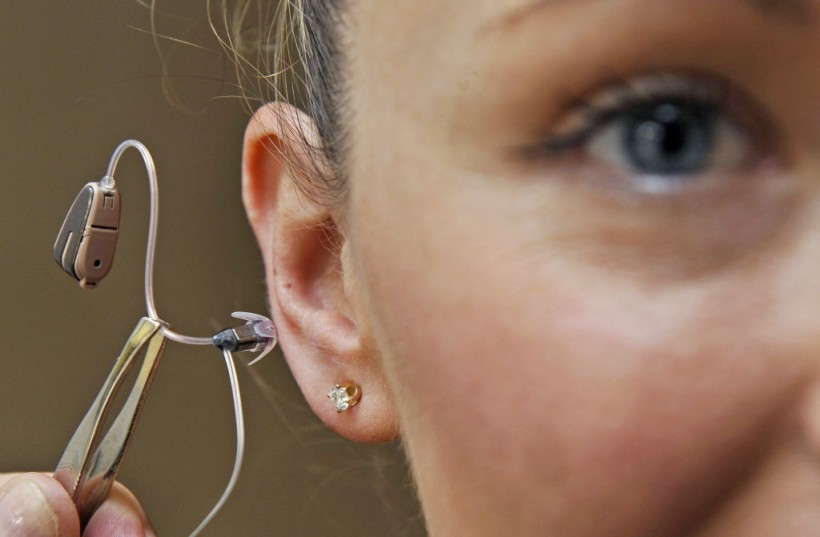Hearing aids increase the clarity and volume of sounds for those who have problems hearing, and this effect likely strengthens or repairs damaged brain connections.
These devices must be customized to each user's unique form of hearing loss, and there is a possibility that doing so may modify some areas of the brain, according to ScienceAlert.

A model displays the world's smallest hearing aid at its Australian launch, in Melbourne on May 7, 2009. The 'Touch' hearing aid is 50 percent smaller than the second smallest external hearing aid and includes noise reduction technology that recognises and turns down background noise. The 'Touch' will be available to the 21 percent of the Australian population affected by hearing loss and is available in 75 different colour combinations.
Singaporean researchers recently analyzed eight lengthy studies on hearing-impaired adults, they discovered that those who used hearing aids were 19% less likely to experience cognitive deterioration than those who did not.
After utilizing hearing aids, participants' short-term cognition test results increased by 3%, according to a subsequent meta-analysis of 11 papers on hearing loss.
The results raise the possibility that hearing aids have remarkable brain effects, but the authors point out that more research will need to be conducted using rigorous randomized trials.
Read also: Cheaper Hearing Aids Now Available Over the Counter, More Tech Companies to Break Into the Industry
The link between Hearing Loss and Cognitive Decline
ScienceAlert reports that this is not the first time that hearing loss and cognitive decline have been linked.
Researchers from Harvard University discovered in 2016 that people with hearing loss who wore hearing aids performed better and more quickly on tests focused on memory and attention.
The results made researchers question if hearing aids could delay cognitive deterioration. But in 2021, a comprehensive review uncovered contradictory findings for the theory.
However, ScienceAlert notes that the latest meta-findings are more conclusive and strongly imply that sound is probably advantageous to the brain.
According to a second theory, those with hearing impairments must exert more mental effort to listen, which saps their ability to concentrate or recall what they are hearing.
Hence, Hearing aids could lessen someone's overall cognitive load in this situation, enhancing their ability to concentrate and recall information.
Another theory contends that social interaction difficulties brought on by hearing loss result in loneliness, which is thought to be a risk factor for dementia as well.
But it is worth noting that these are still theories, so they must be taken with a grain of salt. Yet this also provides opportunities for researchers to study further the link between the use of hearing aids and cognitive deterioration.
Dementia is one of the main causes of death and disability in the world, and researchers expect that the number of cases will triple by 2050.
The research findings were published in the journal JAMA Neurology.
Related Article: First Ever Hearing Aid with Deep Neural Network Helps You Hear Within 12 M 'Real-life' Sound Scenes










